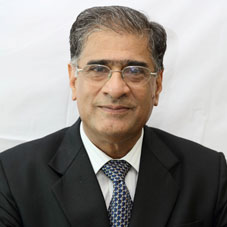
Shyam Lal Uttam
Director
I n a world where industries are constantly evolving and adapting to changing market demands, it takes a visionary leader to navigate the challenges and emerge on top. One such leader is Shyam Lal Uttam, the Director of Busana Remaja Agracipta. Shyam Lal’s journey began after completing his engineering education at Jaipur Malaviya National Institute of Technology in 1971. Shyam then joined Hindustan Machine Tools in 1977. He moved to Australia for a year before returning to Ajmer. Shyam was then transferred to the international marketing unit of HMT in Bangalore, where he worked until 1979 when he was posted in Indonesia as a regional manager for marketing in Southeast Asia.
It was in Indonesia that Shyam's career took a turn toward the manufacturing industry. In 1983, he joined an apparel manufacturing company as a general manager and worked there until 1989, when they increased the company's turnover tenfold in just seven years. To further expand his knowledge, Shyam pursued Management Program from the Asian Institute of Management in Manila before coming back to Indonesia in 1991 to join the Busana Apparel Group. CEO Insights Asia magazine engages in an exclusive conversation with him, let’s get to know more.
Tell about the basic lessons you carry from the Asian Institute of Management.
One pivotal experience in my journey was attending the Asian Institute of Management in Manila. I had always wanted to attend a business school, but life had taken me on a different path after completing my engineering degree. The experience at AIM was eye-opening for me in many ways. It provided me with an in-depth understanding of finance and marketing, especially strategic marketing. AIM also emphasized project operations management and organization development, which gave me valuable insights on how to effectively manage my company's operations. I owe a lot to AIM Manila for the lessons I learned there and for shaping me into the leader I am today.
Share about your organization Busana Remaja Agracipta and its unique selling points.
When we first established our company in 1993, we were completely new to the bra manufacturing industry and initially struggled to find buyers in the market. However, by 1999, we realized that we needed to expand and grow the company, so we made the strategic decision to expand our factory units in Central Java, where wages were half of those in Jakarta, for the longevity of the company. Our aim was to deal directly with large, reputable buyers, including publicly listed companies, in each country we entered, focusing on the top two or three players in each market. We narrowed our product focus to women's intimate apparel, which includes bras, panties, shapewear, loungewear, activewear, and sleepwear, and diversified our market and product range by entering the Australian, Japanese, Asian, European, and North American markets.
To ensure that our company was well-positioned in the market, we focused on the quality aspects of our products, producing top-grade items rather than mass merchandise. We also prioritized using high-level technology in our manufacturing process, including automatic and semi-automatic machines for our products. This strategy allowed us to specialize in technological products that set us apart from our competitors, and attract buyers looking for quality products. In 2002, I started a subsidiary unit in Bangladesh which is now headed by my son Vijay Uttam and has expanded to achieve a turnover of 100 million. A total turnover of 240 million is achieved in Indonesia and Bangladesh. We aim to remain competitive in the market & continue to provide quality products to our customers
Could you share with us the sustainable practices your company has adopted in its operations?
We have been fortunate to work with H&M for nearly 15 years, a company that places great emphasis on sustainability. As a result, we have achieved an impressive social index of 85 and a social sustainability index of 69, the highest in the industry. We have made significant efforts towards sustainability. Additionally, we have contributed to the Indonesian electricity generation company's carbon-free industry program, and currently, 65 percent of our energy is sourced sustainably.
In terms of materials, we are committed to using recycled polyester and nylon, with nearly 50 percent of our polyester and 15 percent of our nylon already being recycled. Our goal is to have 100 percent recycled polyester and 50 percent recycled nylon by 2030. We have also focused on using organic cotton in all our products, and we have conducted research and invested heavily in making our operations as sustainable as possible.
But it's not just about materials and energy. We are equally committed to the social sustainability of our inhouse employees. We use energy efficient LED lighting and inverter motors, and we contribute significantly to employee welfare programs. All our employees are permanent, and 96 percent of them are women. We are actively working to increase the representation of women in our workforce and are proud to say that 96 percent of our employees are women.
Highlight about your plans for the future of the company.
As Indonesia's GDP continues to grow at a steady rate, we must keep up with the competition. To do this, we are looking to expand our business to other countries, particularly in Africa. Although we had initially considered Ethiopia, due to political situations, we have slowed down our thought process, but we are still planning to establish a foothold on the continent in the next three to five years.
In addition to this, we are also focusing on vertical expansion by diversifying the industry. Rather than just manufacturing garments, we are now producing components for the bra industry under a separate company. Overall, our goal is to maintain the steady growth of our company, which has been at 15 percent year on year since 1993.
Shyam Lal Uttam, Director, Busana Remaja Agracipta
Under his leadership, the manufacturing outfit's turnover grew from $3.6 million to a staggering $240 million including a second unit in Bangladesh.



.png)